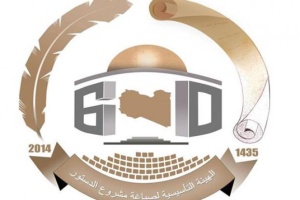Chapter four of the Libyan constitution draft that was approved by the Constituent Assembly on July 29
Libya Constitution – Chapter Four

Chapter Four
Judicial Authority
Article 118: Independence of Judiciary
The Judiciary shall be independent. Its function shall be to establish justice, guarantee the rule of law, and protect rights and liberties. Judges shall be independent in performing their functions and shall only be subject to the law. Judges shall commit to the principles of integrity and impartiality.
Interference with the work of the judiciary shall be a crime to which statute of limitation shall not apply.
Article 119: Members of the Judiciary
The members of the Judiciary shall be the judges and members the public prosecution office. The requirements for their appointment and promotion shall be defined by law ensuring selection and promotion of the best efficient and capable. Their rights, duties, and other functional affairs shall be regulated by law.
Article 120: Guarantees for Members of Judiciary
A member of the judiciary shall only be removed, dismissed, transferred from office or disciplined through a justified decision by the Higher Judicial Council in accordance with the safeguards and cases defined by the law. In cases other than flagrante delicto, actions that affect the rights and liberties may only be taken by authorization of the Higher Judicial Council.
Article 121: Mandate of Courts
The various types and levels of courts shall adjudicate disputes and offences in accordance with the system of judicial jurisdiction to meet the requirements of justice. Hearings shall be public except in juvenile courts, or when the court decides to hold private hearings in observance of public order and morals. In all cases, delivery of judgment shall be public and in accordance with the law.
Article 122: Degrees of Litigation
Except for infringements and cases of de minim is importance as defined by the law, trials shall be organized on two degrees. The jurisdiction of the courts and relevant procedures shall be defined by the law.
Article 123: Prohibition of Special Courts
Establishment of special courts shall be prohibited.
Article 124: Higher Judicial Council
The judiciary shall have a council named the Higher Judicial Council, which shall ensure the proper function in, independence, integrity, effectiveness and development of the judiciary. It shall enjoy a legal personality as well as financial and administrative independence. It shall prepare its draft budget for discussion before the legislative authority.
Article 125: Competences of the Council
The Higher Judicial Council shall have the competence to appoint, promote, transfer, and discipline the members of the judiciary as well as [handle] their functional affairs. It shall also establish courts and prosecution offices according to criteria defined by the law, express opinion on draft laws related to the judiciary and submit related proposals, propose reorganization of the existing judicial bodies or establishment, integrations, or abolishment of other judicial bodies. Also, prepare an annual assessment report on application of the legislations in force by the courts for referral to the legislative authority and it shall be published in the Official Gazette. Its other competences shall be regulated by law.
Article 126: Composition of the Council
The Higher Judicial Council shall be formed by a law provided that its independence and development are guaranteed.
Article 127: Court of Cassation
The Court of Cassation shall consist of a president, deputy, and a sufficient number of judges at levels no less than that of a President at the Court of Appeals or equivalent and they shall be selected by its general assembly. The President and deputy shall be among the three most senior judges. A ruling is issued by the President of the Republic for their nomination.
Article 128: Competences of the Court
The Court of Cassation shall have the competence to review appeals [to quash sentences]. Other competences shall be defined by the law.
Article 129: Public Prosecution
Public prosecution shall be part of the judiciary and shall be presided by the Prosecutor General. Members of the public prosecution shall act on behalf of the Prosecutor General in exercising jurisdictions related to criminal proceedings except as excluded by the law. The President of the Republic shall decree the appointment of the Prosecutor General based on a nomination by the Higher Judicial Council from among the judges of the Court of Cassation, the presidents at the Court of Appeals, or the public attorneys of category A, for a period of six years or for the remaining period until reaching the age of retirement, whichever comes sooner and for one term only.
Article 130: Judicial Inspection Authority
The Judicial Inspection Authority shall be a judicial authority the members of which shall be designated by a decision of the Higher Judicial Council. It shall consist of a president, a deputy, and a sufficient number of members at levels no less than that of a deputy at the Court of Appeals or its equivalent. It shall be competent with conducting inspections on the members of the judiciary in addition to any other competences defined by the law.
Article 131: Judicial Bodies
Department of State Litigation, Department of the Public Defender and Department of Law are judicial bodies the competences of which shall be regulated by law.
Article 132: Law Practice
The practice of law shall be a partner in achieving justice. Lawyers shall enjoy legal safeguards that enable them to perform their duties to contribute to the establishment of justice and defense of rights and liberties. This shall be regulated by law.
Article 133: Military Judiciary
The military judiciary shall be competent with military offences committed by military persons in accordance with the actions defined by law, in a manner that ensures fair trial. This shall include the right to appeal as specified by law.
Article 134: Enforceability of Judicial Rulings
Judicial rulings shall be binding. It shall be prohibited to refrain from implementation of judicial rulings or to suspend an enforceable ruling without a legal.







